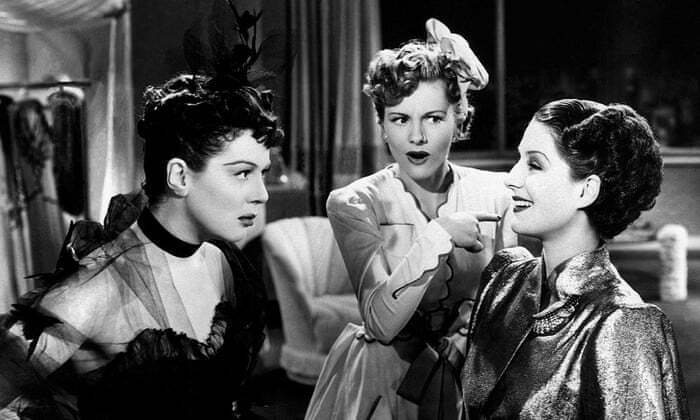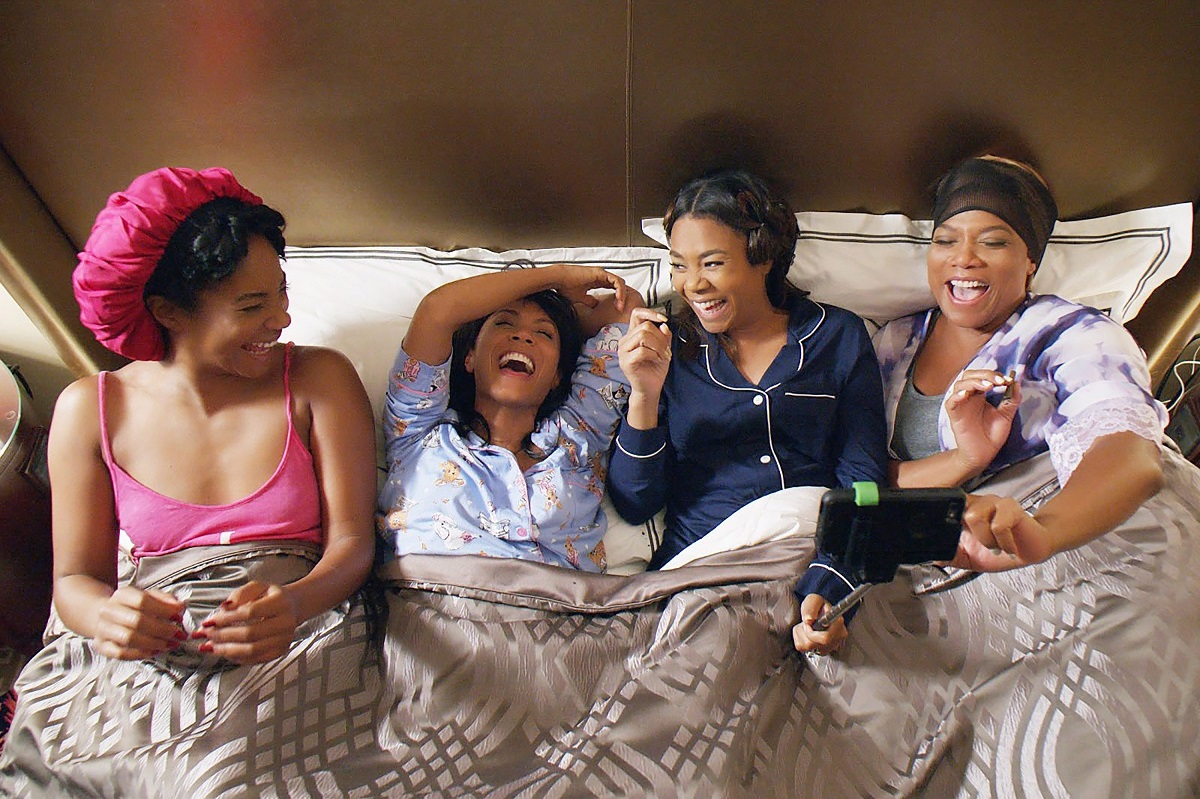Perhaps the most authentic depiction of women’s lives in movies is of their friendships. While the dynamics, expectations, and stereotypes in the portrayal of women as romantic partners, mothers, daughters, and members of the work force have been skewed over the decades, there have always been movies about women who rely on each other for support, who share confidences, and who just enjoy each other’s company. In the past few weeks, two very different movies showed us nuanced and insightful women’s friendships. Netflix’s “Moxie,” directed by Amy Poehler, is based on a book by high school English teacher Jennifer Mathieu and reflects a deep understanding of the way teenagers navigate the changing demands of friendship. “Barb and Star Go to Vista Del Mar” was written by the real-life close friends Kristen Wiig and Annie Mumolo, who play the title roles. While their characters are provincial and silly, they reflect the ebullient pleasure Wiig and Mumolo have in riffing off of each other, and just spending time together.
Strong female friendships have been featured in every genre of movie, from drama (“Beaches“) to heist (“Ocean's 8“) to comedy (“Romy and Michele’s High School Reunion”) to horror (“The Descent“) to comic book movies (“Captain Marvel“). Some movies are about unexpected friendships that develop over the course of the story. Some are about already-established friends who take on challenges together. And others are about the way friendships are tested, and the way they can break apart. In other words, they are all love stories.
Special mention to those who made careers out of playing “the best friend,” most memorably Eve Arden, with her unsurpassable way with a wisecrack. Her closest contemporary heir is Judy Greer, who has been there for what feels like scores of Jennifers and Jessicas in romantic comedies. These characters are there to provide support for the main character’s goal, usually involving romance. Some of them do not even pass the Bechdel test (there are at least two named female characters and they have to talk about something other than men). As endearing as these characters are, they are less friends than sidekicks. As a filmmaker once told me, it’s purely a narrative convenience; if the heroine does not have a sidekick, she has no one to talk to but herself. And it shows that she is worth caring about because someone we like (though she may not merit of story of her own) is devoted to her. Starting in the 1970s, movies began to try to make their white heroines seem a bit more interesting, if not edgy, by giving them best friends who were Black or from the LGBTIA+ community, and often they were there for comic relief. But these movies are not about the friendship, so we will leave them for a list of their own another time.
This list is of movies with two or more women of importance in the narrative. No one is a sidekick. And (except briefly in a few cases) they are not romantic rivals. The friendship itself is the story. In a number of them, it is because women wrote the stories. Here are some of my favorites.
Pitts and Todd (1931-33)
Hal Roach wanted to create a female counterpart to Laurel and Hardy, so he had ZaSu Pitts and Thelma Todd make 17 short comedy films in the 1930s, with titles like “Catch as Catch Can” and “The Pajama Party.” They created some exceptional physical humor—check out this hilarious revolving door scene in 1932’s “The Soilers.” Through it all, their friendship gives the shorts an enjoyable us-against-the-world flavor.
“Imitation of Life” (1934)
This movie based on the book by Fannie Hurst may be a controversial choice, as it tells of a friendship with a very unequal power dynamic based on a racial divide, reflecting the realities of its era. I selected the original version with Claudette Colbert and Louise Beavers rather than the better-known glossy 1959 remake with Lana Turner and Juanita Moore. In the Depression-era version, the business partnership between the two single mothers is much more balanced than in the later one, in which the Black woman becomes the maid for the white aspiring actress. (Also, in the original, the light-skinned Black daughter is played by a Black actress while in the remake she is played by a white actress.)
“Stage Door” (1937)
Edna Ferber co-wrote the play that this film of would-be actresses in a theatrical boarding house is based on. Katharine Hepburn plays a woman from a wealthy family who arrives, inexperienced but confident. Her new roommate is played by Ginger Rogers. Their first scene together has one of the fastest, funniest exchanges of barbed comments and downright insults in movie history. But they develop a friendship and an understanding of the importance of getting past first impressions and recognizing the need to care for the vulnerable.

“The Women” (1939)
It’s been remade twice (so far) but nothing comes close to the original, based on the Clare Boothe Luce play known for dialogue as sharp as the Jungle Red-painted fingernails of its pampered New York Society wives and the women who want to steal their husbands. “The Women” is a rare film without a single male onscreen and the all-star cast (in fabulous Adrian gowns) is dazzling. The friendships shift over time, but some are loyal and enduring, with Paulette Goddard delivering one of the best offers of support in the history of movies—or friendship. On her way to an event where she will see the conniving woman now married to her friend’s ex-husband, she says, “Want me to spit in Crystal’s eye for you?” She responds to a smiling shake of the head with a wicked smile of her own. “You’re passing up a swell chance, honey. Where I spit no grass grows ever.”
“Old Acquaintance” (1943)
This one falls into the “frenemy” category both on and off-screen, and was co-written by the only female staff writer at Warner Brothers, Lenore Coffee. “Old Acquaintance” stars Bette Davis and Miriam Hopkins, who were professional and romantic rivals in real life and their characters are in this film as well. Davis plays a respected literary novelist who has published very little and made almost no money. She is single, while her old friend played by Hopkins has a husband and child and manages to toss off a trashy book that is a big hit. While Davis cannot hide the look of satisfaction as her character throttles Hopkins, the characters remain friends. (The film was remade as “Rich and Famous” in 1981 with Jaqueline Bisset and Candace Bergen.)
“Tender Comrade” (1943)
This story of a group of women who band together during WWII while the men in their lives are away was lauded as a morale-builder during the war. Variety even called it “a preachment for all that democracy stands for.” But a few years later, during the Red Scare/blacklist era, it was ret-conned as Communist propaganda because the women lived together and took care of each other. The film is soapy by today’s standards, but it’s a valuable portrayal of women supporting each other and forming true friendships with those they might not have under normal circumstances.

“How to Marry a Millionaire” (1953)
Lauren Bacall, Betty Grable, and Marilyn Monroe play three models who join forces to look for rich husbands in this triple-strength rom-com. None of the scenes with their romantic counterparts come close to the sizzle of the three leading ladies just talking to each other. (See also: “Gentlemen Prefer Blondes,” with Monroe and Jane Russell.)
“Julia” (1977)
The truth of Lillian Hellman’s memoir is disputed, but this movie based on the writer’s story about her friendship with a woman who was fighting the Nazis features beautiful performances by Jane Fonda and Vanessa Redgrave, who was awarded an Oscar. (Keep an eye out for the first film appearance of Meryl Streep.)
“Nine to Five” (1980)
A rare women-led workplace story, “Nine to Five” has three strong leads in Lily Tomlin, Jane Fonda, and Dolly Parton as women who turn office policies upside-down to make them less sexist and more employee-friendly. The scenes of the three women commiserating on the unfairness at the company and plotting to make changes are enormous fun—and illuminating.
“Steel Magnolias” (1989)
Playwright/adapting screenwriter Robert Harling based this story on the women he knew growing up. The powerhouse cast includes four Oscar winners, Shirley MacLaine, Sally Field, Olympia Dukakis, and Julia Roberts, along with Daryl Hannah and Dolly Parton. We see the women stick together through happiness and devastating tragedy, not just tolerating each other’s quirks but enjoying them. Like “The Women,” the film spends a lot of time in women-centered spaces like the beauty salon. Its tone—and the tone of many friendship stories—is summarized in Parton’s classic line, “Laughing through tears is my favorite emotion.”

“Thelma and Louise” (1991)
Susan Sarandon and Geena Davis star in this film (which earned Callie Khouri an Oscar for Best Original Screenplay) as two friends whose weekend getaway turns into an adventure of self-discovery as they respond to unexpected threats with even more unexpected toughness. As Roger Ebert wrote, “Thelma and Louise begin to grow intoxicated with the scent of their own freedom—and with the discovery that they possess undreamed-of resources and capabilities.” They recognize that there’s no going back and still find the choice worthwhile.
“Waiting to Exhale” (1995)
Based on the book by Terry McMillan, this movie of four friends who support each other through romantic ups and downs may not pass the Bechdel test, but the portrayal of strong, accomplished Black women (beautifully played by Whitney Houston, Angela Bassett, Lela Rochon, and Loretta Devine) sharing confidences and encouragement makes us wish we could be part of the group as well.
“Boys on the Side” (1995)
The title is never mentioned in the film, but it underscores the theme of women’s relationships as the primary foundation of these characters’ lives. Whoopi Goldberg, Drew Barrymore, and Mary-Louise Parker star in this story of women who would be unlikely to know each other, much less become devoted friends. But on a road trip with one looking forward, one looking back, one trying to escape—a trip that tellingly never reaches its original destination—the three characters form one of the sweetest connections on film. The soundtrack features songs by female performers like the Indigo Girls, Joan Armatrading, Annie Lennox, and Sheryl Crow.
“Set It Off” (1996)
Roger Ebert gave this story of four women who plan a robbery a three-and-a-half-star review. He wrote, “It creates a portrait of the lives of these women that’s so observant and informed; it’s like ‘Waiting to Exhale’ with a strong jolt of reality. The movie surprised and moved me: I expected a routine action picture and was amazed how much I started to care about the characters.” It was co-written by Kate Lanier. The outstanding cast includes Queen Latifah, Jada Pinkett Smith, Vivica A. Fox, and Kimberly Elise. The robbery scenes, including a thrilling chase scene, are exceptionally staged, but the connections between the women are even more compelling. (See also: “Ocean’s 8”).
“Bend It Like Beckham” (2003)
Yes, there’s a brief romantic rivalry in this one. But it’s primarily the story of the friendship between two young women who love soccer. Directed and co-written by Gurinder Chadha, the film shines for its humor, its dynamic soccer gameplay, its touching romance and warm-hearted family scenes, and for its portrayal of a generous and loyal friendship.

“For a Good Time Call…” (2012)
Lauren Miller Rogen co-stars with Ari Graynor in this sly comedy that Miller Rogen wrote with Katie Anne Naylon, a story about a would-be literary agent who has to move in with a woman she dislikes intensely (Ari Graynor), only to discover that her new roommate supports herself as a phone sex worker. They end up becoming co-workers and the closest of friends.
“Frances Ha” (2013)
Greta Gerwig co-wrote and stars in this exceptionally perceptive look at the way friendships shift as we move into (or don’t move into) the next stage of our lives. We never know how much the relationships of early teens and 20s, depend on seeing each other every day and going through the same experiences together. At the beginning of this film, Gerwig’s character happily plans a lifetime of connection with her friend, but has to learn that sometimes BFFs are not forever after all. (See also: “Walking and Talking,” written and directed by Nicole Holofcener and “Booksmart,” directed by Olivia Wilde).
“Girls Trip” (2017)
A wild comedy and a huge box office hit, this raunchy but heartfelt film about the reunion of four college friends at the Essence Festival did for grapefruit what “American Pie” did for pie and “Call Me By Your Name” did for peaches. The characters and the comedy stars who play them—Regina Hall, Jada Pinkett Smith, Tiffany Haddish, and Queen Latifah—clearly have a blast, and so does the audience. (See also: “Bridesmaids,” written by Kristen Wiig and Annie Mumolo).
“Someone Great” (2019)
Writer/director Jennifer Kaytin Robinson made one of the all-time great tributes to female friendships, with dazzling performances by Gina Rodriguez (who also co-produced), DeWanda Wise, and Brittany Snow. They play the kind of ride-or-die friends who call in sick when their friend has a broken heart, support her through some questionable choices and mood swings, and tell her when she is wrong.












